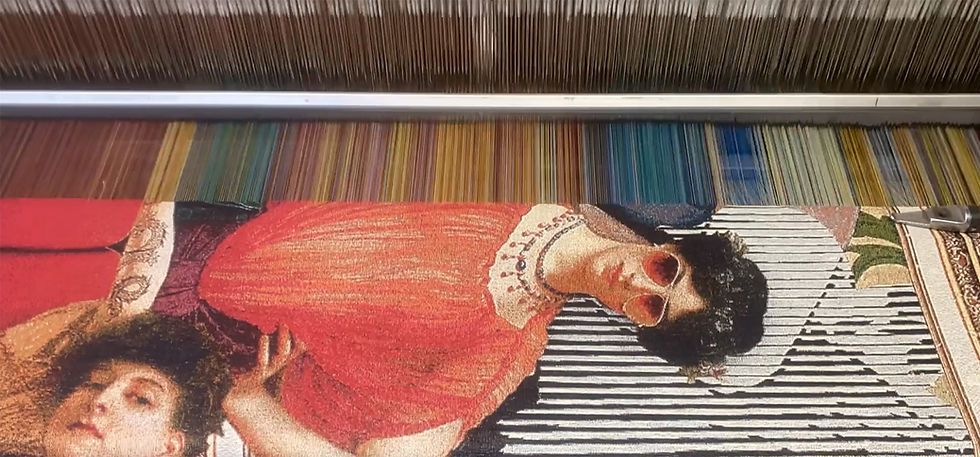Mitigating the Textile Industry’s Impact on Climate Change: How FiberArt is Leading the Way
- Melissa Psihudakis
- Apr 14
- 3 min read
The textile industry has long been one of the world’s most significant contributors to pollution and carbon emissions. From excessive water consumption to synthetic waste filling up landfills, the environmental cost of mass production is staggering. At FiberArt, we recognize the urgent need for change and are committed to being a part of the solution.

A Call to Action: How Hurricane Helene Sparked a Shift
For us, the push toward sustainability isn’t just about industry trends or corporate responsibility—it’s personal. Our hearts break for the people of the Carolines after witnessing the devastating aftermath of Hurricane Helene, where we saw firsthand the impact of climate change on communities, landscapes, and livelihoods. Extreme weather events like Helene are becoming more frequent due to rising global temperatures, and industries like ours must acknowledge their role in this crisis.
We realize that if we want to continue our craft while protecting the planet, we need to overhaul our operations and set new standards for sustainability in textiles. FiberArt’s sustainability initiatives go beyond surface-level greenwashing; we’ve made fundamental changes to our energy use, water consumption, and waste management to minimize our environmental impact.
Harnessing the Power of the Sun
One of the most significant ways we’ve reduced our carbon footprint is by transitioning to solar energy to power our manufacturing facility. The textile industry has traditionally relied on fossil fuels, but FiberArt has drastically cut its greenhouse gas emissions by switching to solar-powered operations.
Solar power allows us to operate with clean, renewable energy, reducing our reliance on the grid and decreasing the overall carbon footprint of each woven piece we create, meaning that when you purchase a custom blanket or tapestry from FiberArt, you’re not just investing in high-quality craftsmanship—you’re supporting an environmentally responsible production process.
Recycling 100% of Our Waste
Waste is one of the biggest environmental challenges in textile manufacturing. Traditional mills discard massive amounts of excess fabric, sending tons of unused material to landfills every year. FiberArt has taken a different approach by implementing a zero-waste policy—we recycle 100% of our textile waste.
Every scrap of fabric left over from production is repurposed. Nothing goes to waste, whether it’s ground down for insulation, used in other textile applications, or sent back into the weaving process. This initiative prevents unnecessary landfill overflow and reduces the demand for new raw materials, conserving resources and cutting emissions from textile production.
Water Conservation and Reclamation
Water waste is another major issue in the textile industry, with traditional dyeing and finishing processes requiring millions of gallons of water each year. At FiberArt, we have invested in water reclamation systems to ensure that our processes are as water-efficient as possible.
Our system captures, filters, and reuses water, significantly reducing consumption and preventing harmful wastewater runoff. This initiative helps conserve one of the planet’s most precious resources while ensuring that our production remains environmentally responsible.
Using Recycled Cotton for a Sustainable Future
Sourcing sustainable materials is just as important as reducing waste. That’s why FiberArt has made the shift toward using recycled cotton in our woven blankets and tapestries. Instead of relying solely on virgin cotton, which requires massive amounts of water and pesticides to produce, we incorporate recycled fibers, reducing our environmental impact.
By repurposing cotton that would otherwise go to waste, we minimize the need for new raw materials, decrease water usage, and reduce the pollution associated with large-scale cotton farming. Every FiberArt product is crafted with sustainability in mind, ensuring that you can enjoy high-quality, beautiful textiles without contributing to environmental harm.
Pushing for Change in the Industry
Our commitment to sustainability doesn’t stop at our production process. We believe that the entire textile industry needs to evolve, and we’re actively working to push for change on a larger scale.
By setting an example through solar-powered production, waste-free manufacturing, and sustainable sourcing, we hope to encourage other companies to adopt similar initiatives. FiberArt is proof that high-quality craftsmanship and sustainability can go hand in hand.
The Future of Sustainable Textiles
Climate change isn’t a distant threat—it’s happening now. But businesses have the power to make a difference. At FiberArt, we’re committed to continually improving our sustainability practices and finding new ways to reduce our environmental impact.
When you choose FiberArt, you’re not just buying a product—you’re supporting a movement. Every woven blanket, tapestry, or textile piece you purchase is a testament to the fact that art and sustainability can coexist. Together, we can shape a future where the textile industry is no longer a major polluter, but a leader in environmental responsibility.
Let’s create a better world—one woven thread at a time.
Either contact us at info@fiberart.com or fill out our contact form whenever you are ready to get start creating sustainable products!



Comments